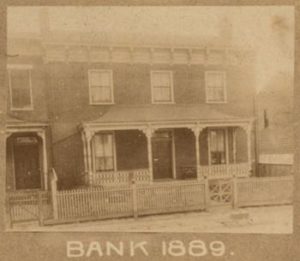
True Reformer Bank lobby
*The Virginia legislature chartered the Savings Bank of the Grand Fountain United Order of the True Reformers (GFUOTR) on this date in 1888. They began business on April 3, 1889. This was the first Black-owned financial institution in America.
The True Reformers bank was an extension of the fraternal organization, the United Order of the True Reformers. The history of American Black capitalism began despite Jim Crow segregation after the Civil War and during the first thirty years of the 20th century. Because economic empowerment was another vehicle for equality, a great entrepreneurial spirit showed in the escalation of Black banks, insurance companies, newspapers, and other enterprises that served the Black community.
However, the Black church and fraternal organizations raised and channeled that economic spirit into empowerment. At first, Black churches didn’t have businesses in the traditional sense, but they had buildings and real estate. This represented the only significant assets owned by blacks. These institutions collected large contributions and soon established the first Black banks. Because of the enormous growth of Black-owned banks, there was a consequential growth of Black businesses with receipts in the millions of dollars from products sold primarily to a Black consumer market.
This couldn’t have materialized without the capital and credit that Black banks provided and white-owned financial institutions were unwilling to give. For example, Richard Wright established Citizens and Southern Bank and Trust Company. He played a vital role in launching many small enterprises, including grocery stores, bakeries, cleaning establishments, and caterers. Between 1888 and 1934, 134 Black banks were established, while from 1867 through 1917, the number of Black businesses increased from 4,000 to 50,000.